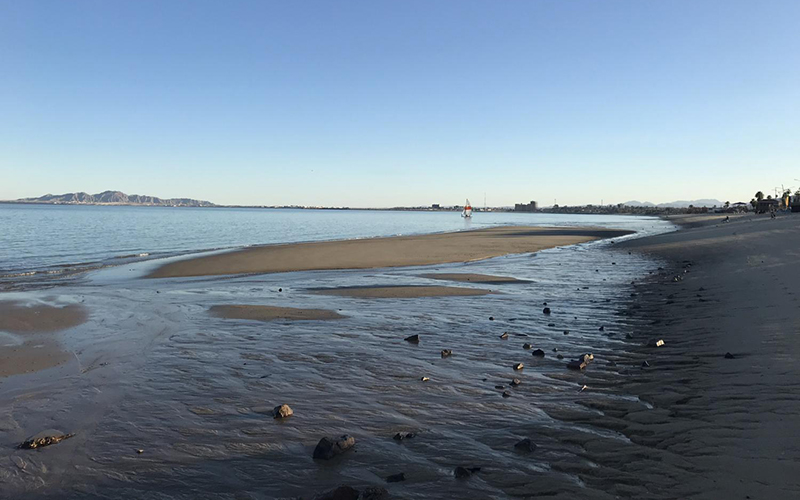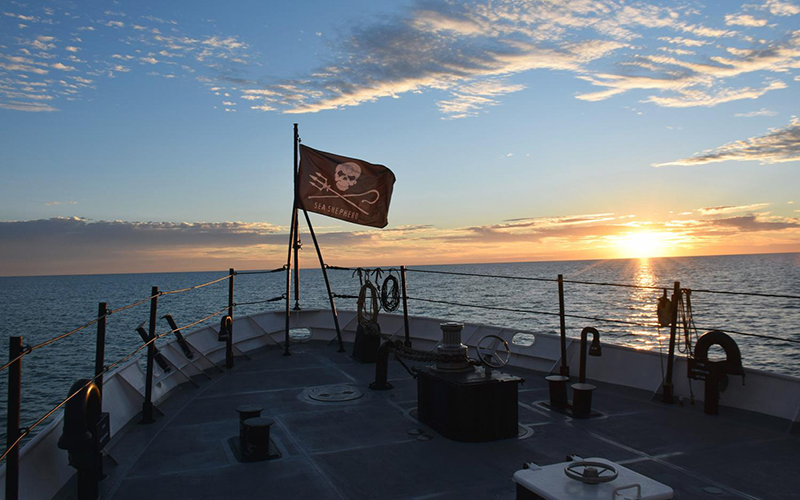
The northern tip of the Sea of Cortez is the only place where the vaquita marina – the world’s rarest marine mammal – is found. That limited range is just one of the challenges faced by the little porpoise. (Photo by Kendal Blust/KJZZ)
SAN FELIPE, Baja California – “Bienvenidos al Nido,” Francisco Iñegas said. “Welcome to El Nido.”
He walks across what look like huge, gray connector blocks fitted together into a floating pathway. Then he climbs up into El Nido, an open-sea aquarium just off the small town of San Felipe in Mexico’s Sea of Cortez.
“The totoaba are over here,” he said, showing two sea pens enclosed in nets where a giant, endangered fish called the totoaba is being farmed.
He tosses food pellets into the pens, and dozens of totoaba swim to the surface, gulp down the pellets, then dive back into the murk.
This floating aquarium was meant to save a small, nearly extinct porpoise called the vaquita marina.
“We came here to help the vaquita,” said Juan Carlos Vivanco, director of the company Aquario Oceánico. “Let’s say, to save it.”
Vivanco’s team brought El Nido aquarium to the Sea of Cortez a year ago to house a captive population of vaquitas. But capturing the porpoise proved too stressful for the little animal. One had to be released almost immediately, and another died in the process.
With fewer than 30 vaquitas remaining, scientists decided it would be too risky to try again.
El Nido might have been the vaquita’s last chance for survival. But Vivanco says the vaquita’s supporters refuse to give up hope, and from that failure came a new plan.
“The idea is, let’s try totoaba,” he said.
Illegally hunted totoaba are considered the leading threat to vaquitas, which get tangled in poachers’ gillnets and drown.
Totoaba swim bladders, or buches, sell for tens of thousands of dollars on the black market in China. And cartel-backed smuggling of the fish has surged since 2012.
By farming totoaba, Vivanco said, a legal trade for both totoaba meat and buches can be created, which he thinks that will undermine poachers.
“Help totoaba and you will be helping vaquitas,” he said.
Probability game
The vaquita’s situation is desperate – the reality is, no one knows whether it will survive. But marine biologist Mauricio Nàjera thinks there’s reason for hope. In September, scientists spotted six of the shy porpoises, including a mother and calf.
“It’s a light at the end of the tunnel,” he said. “A hope that the species will survive.”
All the vaquita needs now, he added, is time to recuperate its population naturally.
But species recovery is a numbers game. And when a population dips as low as the vaquita’s, it a comeback isn’t easy, said John Koprowski, director of the University of Arizona School of Natural Resources and the Environment.
Related stories:
 • Vaquita’s last stand: The struggle to save the world’s rarest marine mammal
• Vaquita’s last stand: The struggle to save the world’s rarest marine mammal
• Vaquita’s last stand: Fishermen want to help, but need to feed their families, too
“When you get down to 30 animals or 50 animals or 15 animals, the probability game is really working against you,” he said.
The vaquita’s small range provides natural challenges, he said, “and then you throw in some challenges created by humans. That’s when things become quite dire.”
But that doesn’t mean recovery is impossible, he said. Other animals have successfully come back from populations this low before.
“I think that most conservation biologists at some level are optimists,” Koprowski said. “We’re doing it because we think there’s an opportunity to make a difference. I hate to give up too early.”
Lorenzo Rojas, who coordinates marine mammal research and conservation in Mexico, agreed.
“That’s the case with vaquita,” he said. “We have a very good chance that recovery is possible.”
Rojas said vaquitas appear to be well-nourished and healthy; they have enough genetic diversity to survive; and scientists recently discovered that females can have calves every year, instead of every other year like they initially believed.
The key now is to protect them from outside threats, he said, which will depend in part on Mexico’s President-elect, Andrés Manuel López Obredor, who takes office Dec. 1.
Alejandro Oliveras, a Mexican representative for the Center for Biological Diversity in Tucson, said there’s a lot of uncertainty about what López Obredor will do to protect the vaquita. Many fishermen think he’ll re-open this part of the Sea of Cortez to gillnet fishing. Others believe he’ll crack down on illegal poaching.
“But if the new president doesn’t do anything to protect the vaquita, it’s likely that it will go extinct during his administration,” Oliveras said.
‘Hope dies last’
Back at the harbor in San Felipe, the wooden docks creak and sway.
Henoch Rizo is sitting in a boat the nonprofit Museo de Ballena uses to help pull illegal fishing nets that threaten the vaquita.
The task is daunting, Rizo said, and there’s no question that the odds are stacked against the little porpoise.
“But like we say in Mexico, ‘Hope dies last,'” he said. “Until we see that there’s not a single vaquita left, we’ll have hope that it can be saved.”
This story is part of Elemental: Covering Sustainability, a new multimedia collaboration between Cronkite News, Arizona PBS, KJZZ, KPCC, Rocky Mountain PBS and PBS SoCal.